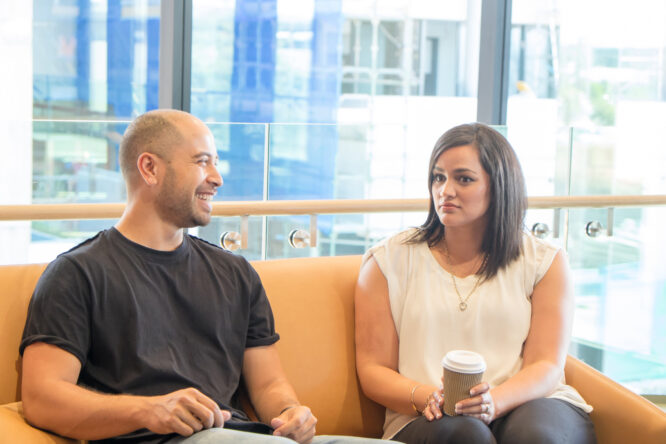Opening up about trauma you’ve experienced in life for the first time can feel terrifying.

You want to be honest and get things off your chest, but you also want to protect yourself and not make what you’ve been through feel any more painful than it already does. However, sharing your emotions and offloading your baggage can be incredibly healing, not to mention bring you closer to the people in your life who care about you. You just have to find the strength to speak up. If you’re standing at that crossroads, here are some gentle, real-world tips to make the process feel a little safer and a little more manageable.
1. Choose the right person to open up to.

Not everyone deserves front-row seats to your most vulnerable moments. Pick someone who’s shown they can handle serious conversations—someone who listens without rushing to fix or judge. Trust your gut; if you feel even a little safer around them, that’s a good sign. You’re not looking for the perfect listener, just someone who feels steady and trustworthy enough to hold a piece of your story. You don’t owe your truth to anyone who’s made you feel small or dismissed before.
2. Start with a smaller piece of your story.

There’s no rule that says you have to spill everything all at once. Sharing just a small part—a sentence, a memory, a feeling—can help you gauge how it feels to be vulnerable without overwhelming yourself. It’s like dipping your toe in the water before diving in. You deserve to set the pace, and if the conversation goes well, you can always share more later when you’re ready.
3. Remind yourself that shaking, crying, or rambling is normal.

When you talk about hard stuff, your body might react before your brain catches up. Shaky hands, tears, forgetting your point—it’s all part of the process, not a sign that you’re doing it wrong. Try to let those reactions happen without judging yourself. Your body’s just processing emotions that have been bottled up for a long time. It’s messy sometimes, and that’s completely okay.
4. Practise saying a few things beforehand.
 Source: Unsplash
Source: Unsplash It might help to practise a few phrases out loud before you share. Things like, “There’s something I’ve never really talked about before,” or “This is hard for me to say, but I trust you.” Giving yourself a little script can take some of the edge off. You don’t have to stick to it word-for-word when the moment comes, but having a few go-to lines in your back pocket can help you feel a little less like you’re freefalling.
5. Don’t feel like you have to explain every detail.
 Source: Unsplash
Source: Unsplash You don’t owe anyone a full timeline, a list of receipts, or a detailed breakdown of everything that happened. If you want to keep parts private, that’s your right. Share what feels manageable, not what feels draining. Your story is still valid, even if you only share the headline version. Healing isn’t measured by how much you reveal; it’s measured by how safe and honest you feel while doing it.
6. Prepare yourself for a few awkward pauses.
 Source: Unsplash
Source: Unsplash Sometimes when you drop something heavy into a conversation, there’s this weird, uncomfortable silence afterward. That doesn’t mean you’ve said something wrong. It just means the person is taking it in. Give them (and yourself) space to breathe. Let the silence be part of the process instead of rushing to fill it. It’s often in those pauses that the deepest understanding starts to grow.
7. Remember that you’re allowed to cry—or not.
 Source: Unsplash
Source: Unsplash Some people expect a flood of tears when talking about painful memories, and some worry that if they don’t cry, they’re somehow “not feeling it enough.” Neither is true. Your emotions are valid however they show up, or don’t. Sharing your past is brave, whether you’re sobbing or speaking calmly. There’s no right emotional reaction, and you’re not performing. You’re simply telling your truth in your own way.
8. Give the person permission to just listen.
 Source: Unsplash
Source: Unsplash Sometimes it helps to say upfront, “I’m not looking for advice; I just need someone to hear me.” It takes the pressure off both you and them. You get to stay in the moment without worrying about getting bombarded with solutions. Most people want to help, but don’t always know how. A gentle reminder that listening is enough can make it easier for both of you to stay present and connected.
9. Accept that you might feel a vulnerability hangover.
 Source: Unsplash
Source: Unsplash After you share, it’s completely normal to feel a little exposed or anxious. You might second-guess yourself, wonder if you said too much, or even feel like pulling back. That’s called a vulnerability hangover, and it’s totally normal. Try to ride it out without panicking. Those feelings don’t mean you made a mistake; they just mean you did something brave and your mind is adjusting to a new level of openness.
10. Be proud of yourself for even trying.
 Source: Unsplash
Source: Unsplash Even if it doesn’t go perfectly, even if you stumble over your words, the fact that you’re willing to try sharing your story is huge. It’s a sign of healing, even if it doesn’t feel neat and tidy yet. Every attempt at honesty, every step toward connection, strengthens the part of you that’s fighting to live lighter and freer. That’s something worth celebrating, no matter what.
11. Remember that one conversation doesn’t have to fix everything.

Sharing your painful past won’t instantly erase the hurt or make everything okay overnight. It’s just one step on a much bigger journey—a powerful, important step, but still just one. Take the pressure off this one conversation having to be perfect or transformative. Healing usually happens in layers, little by little. This is just the beginning, not the final destination.
12. Allow yourself to set boundaries if you think it’s necessary.

If after opening up you realise you need to pull back, take a break, or not answer certain follow-up questions, that’s okay. Sharing your story doesn’t mean handing over control of it. You’re allowed to decide what feels right in the moment. Protecting your energy isn’t selfish, it’s smart. It helps ensure that when you share your story, you do it from a place of strength, not pressure.
13. Trust that the right people will handle your truth with care.

One of the hardest things about being vulnerable is the fear that you’ll be met with judgement or dismissal. And while sadly, not everyone knows how to respond well, the people who deserve a place in your life will meet your honesty with care, not criticism. Trust that your courage will eventually attract the kind of connections that feel healing, not harmful. And remember: the way someone reacts says far more about them than it does about you.
14. Keep reminding yourself: your story matters.
 Source: Unsplash
Source: Unsplash Even if your voice shakes. Even if you struggle to find the words. Even if you wonder halfway through if you should have stayed silent. Your story matters. Your feelings matter. You matter. Sharing your painful past isn’t about reliving it; it’s about reclaiming it. Turning something that once hurt you into something that sets you free. That’s one of the bravest, most beautiful things you can do for yourself.




